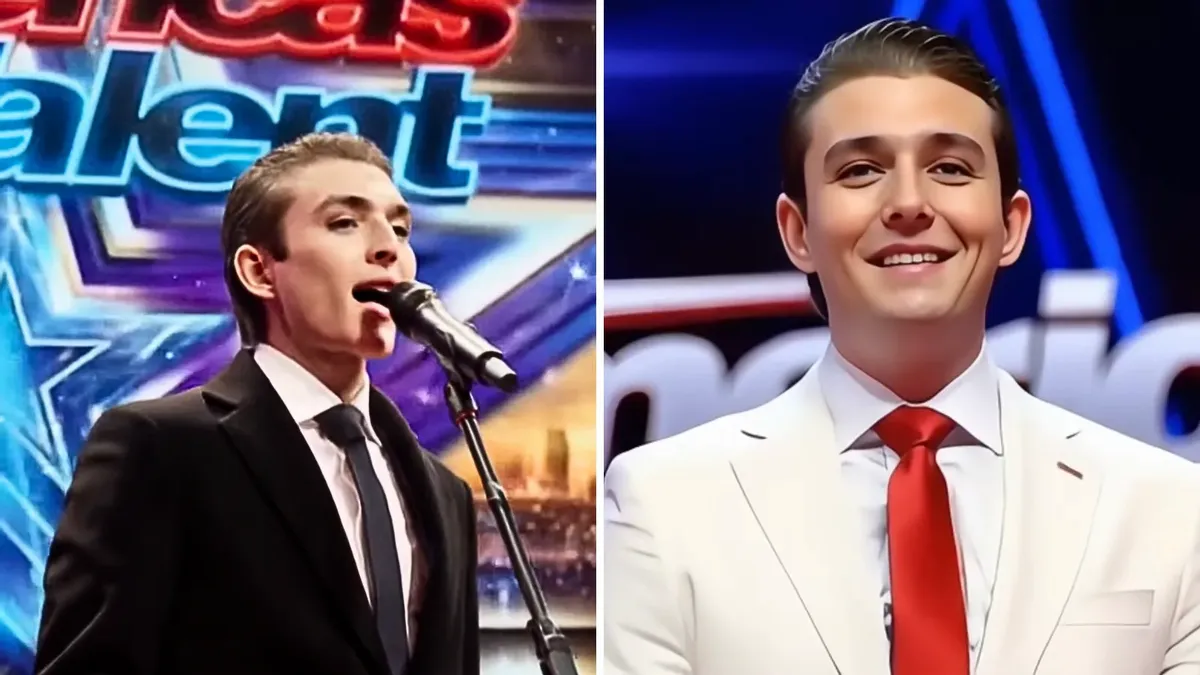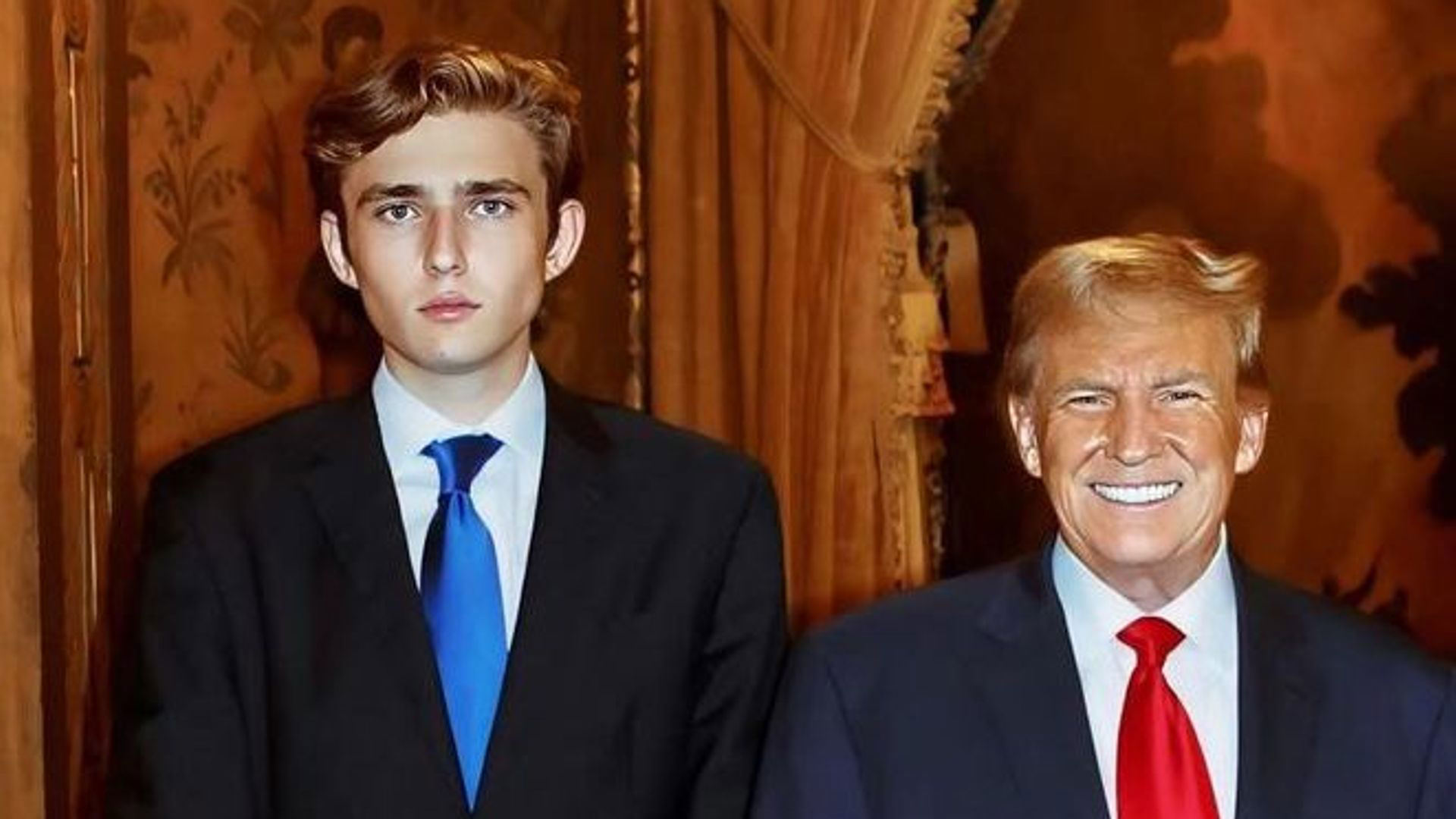Did Barron Trump Sing On AGT? Unveiling The Truth | Fact Vs. Fiction
Did Barron Trump, the youngest son of former President Donald Trump, really take the stage on "America's Got Talent" and stun the world with his vocal talents? The answer, as it turns out, is a resounding no, despite a flurry of online videos suggesting otherwise. This article delves into the viral phenomenon, separating fact from fiction and exploring the origins of the intriguing, yet ultimately fabricated, narrative.
The digital landscape, particularly social media platforms, is a breeding ground for both genuine news and deceptive content. In the case of Barron Trump and "America's Got Talent," the latter seems to have taken root, flourishing in the fertile ground of online speculation. Videos began circulating, purportedly showcasing the younger Trump's performance on the popular talent show. These clips, often accompanied by glowing praise and claims of a breathtaking audition, quickly gained traction, drawing significant views and sparking widespread online discussion. However, a closer examination reveals a different story, one of clever editing, AI-generated content, and the persistent human desire to believe in the unexpected.
To fully understand the situation, it's helpful to have a clearer picture of Barron Trump himself. Here's a brief overview:
| Category | Details |
|---|---|
| Full Name | Barron William Trump |
| Date of Birth | March 20, 2006 |
| Parents | Donald Trump and Melania Trump |
| Siblings | Donald Trump Jr., Ivanka Trump, Eric Trump, Tiffany Trump |
| Education | Attended Columbia Grammar & Preparatory School (New York City) and currently attending a private school. |
| Public Profile | Has maintained a relatively private life compared to his siblings, though he's been seen at various public events. |
| Interests | Reportedly enjoys sports, particularly golf. |
| Current Status | Continuing his education. |
| Notable Events | Attended his father's presidential inauguration and various campaign events. |
Reference: Wikipedia - Barron Trump
The initial surge of these videos coincided with a noticeable increase in Google searches. Queries like "Did Barron Trump sing?" and "Was Barron Trump on America's Got Talent?" experienced a spike, indicative of the public's curiosity and the viral spread of the false narrative. The videos themselves, often crafted with surprising skill, depicted a young man with a voice that, according to the accompanying commentary, captivated judges and audiences alike. These clips, designed to evoke a sense of wonder and surprise, were shared across platforms like TikTok, YouTube, and other social media sites, leading to a significant degree of online virality.
A closer look at the videos reveals several inconsistencies. The most glaring issue, and the one that immediately casts doubt on their authenticity, is the lack of any corroborating evidence from reputable news sources. Major media outlets, known for their comprehensive coverage of the Trump family and entertainment news, would have undoubtedly reported on such a significant event. The absence of any such coverage served as an early indicator that something was amiss. Furthermore, closer inspection showed the videos to be the product of deepfakes or clever editing.
The underlying question, did Barron Trump sing on "America's Got Talent"? has gained traction online, prompting many to wonder about the origins of this viral claim. The popularity of the show, combined with the public's interest in the Trump family, created a perfect storm for the spread of misinformation. The videos' creators likely capitalized on this curiosity, crafting content designed to generate clicks, shares, and engagement, regardless of its factual accuracy. One video in particular has garnered over one million views.
The lack of official confirmation from "America's Got Talent," or any reliable media outlets, further underscores the fabrication. No official announcements were made, and no press releases were issued, which is highly unusual given the high profile of Barron Trump and the widespread media interest in the Trump family. Had Barron Trump actually participated in the show, it would have been front-page news, covered by major television networks, newspapers, and online news sites globally.
The viral videos themselves, though compelling, are ultimately a testament to the power of digital manipulation. Deepfake technology and sophisticated editing techniques allow creators to convincingly fabricate scenarios, blurring the lines between reality and illusion. These technologies are increasingly accessible, empowering individuals to create highly realistic, yet entirely fictional, content. The Barron Trump "AGT" videos likely utilized these techniques to create a convincing illusion, preying on the audience's desire for surprise and entertainment.
The genesis of this rumor can be traced back to the increasing prevalence of AI-generated content. Artificial intelligence is evolving rapidly, capable of producing realistic videos that are often indistinguishable from genuine footage. It is highly probable that AI technology was utilized to create the illusion of Barron Trump singing on the show. These videos, though cleverly crafted, lack the authenticity of genuine footage.
The desire to separate fact from fiction requires a critical approach. Examining the source, evaluating the credibility of the information, and seeking corroboration from reliable sources are all essential steps in verifying the truth. In the case of the Barron Trump singing videos, a quick search reveals the absence of any evidence from official sources, rendering the claims dubious. This case study acts as a stark reminder of the importance of verifying information, especially in the age of rapidly evolving digital technologies and the ever-present threat of disinformation.
The videos often showed Barron Trump performing a song, often accompanied by emotional expressions from the "judges" and the audience. The videos were designed to elicit an emotional response from the viewer, and many people, enticed by the emotional appeal, failed to conduct the necessary investigation to confirm the veracity of the content. The success of the videos in garnering a large number of views and shares underscores the challenges of navigating the digital information environment.
There is no credible evidence to suggest that Barron Trump has ever appeared on "America's Got Talent". The absence of any corroborating evidence in the official media channels serves to emphasize that these claims are unfounded. The popularity of the rumors shows the need to assess information carefully, as well as to consider the source of the material.
The question of whether Barron Trump has ever considered pursuing a musical career is something that remains unknown to the public. His interests have been kept private, and there is no known information about him displaying musical talents or a particular desire to work in the entertainment industry. It is important to remember that Barron Trump is a private individual, and his personal interests are not necessarily the public's business.
The proliferation of these fabricated videos highlights a larger issue: the erosion of trust in digital content. The speed at which misinformation spreads, coupled with the sophistication of the techniques used to create it, makes it increasingly difficult to discern truth from falsehood. This case serves as a warning, underscoring the need for media literacy, critical thinking, and a healthy dose of skepticism in the digital age.
The allure of the unexpected, the element of surprise, and the potential for a heartwarming story all contributed to the viral nature of this false narrative. In essence, the story of Barron Trump singing on "America's Got Talent" is a cautionary tale, a reminder that not everything seen online is true. It underscores the importance of critical thinking, verifying sources, and approaching digital content with a discerning eye. In the age of AI and deepfakes, the ability to distinguish between fact and fiction is more critical than ever before.
Ultimately, the answer to the question remains clear: Barron Trump did not sing on "America's Got Talent." The videos are a fabrication, the product of creative editing or AI-generated content designed to capture attention and generate online engagement. This experience should prompt us to be ever vigilant in evaluating digital content, confirming information from trustworthy sources and prioritizing media literacy to protect ourselves from misinformation and avoid being deceived by compelling, yet ultimately false, claims.


